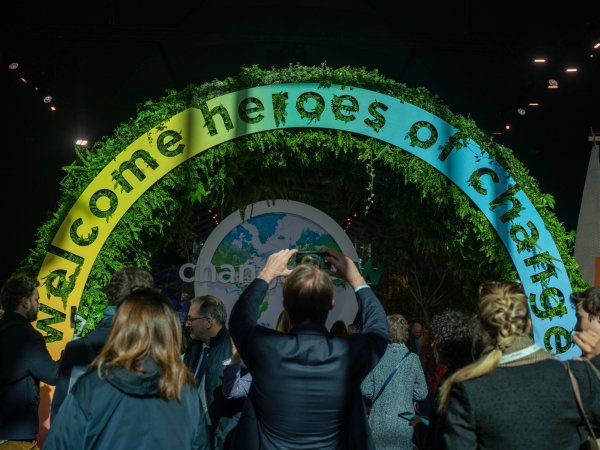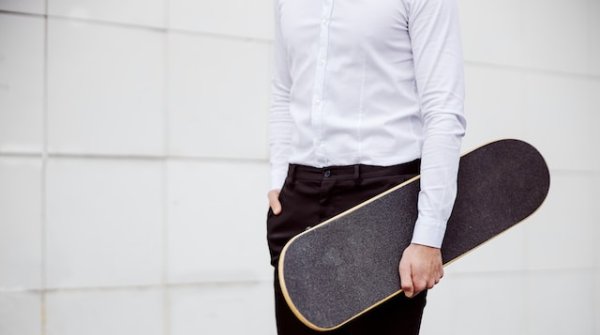Sport for Change was the place to be: the sport special at the changeNOW trade show, which brought together 1,000 concrete solutions for a more sustainable world with potential investors in Paris at the end of March, networked the current big players in the sport ecosystem. The goal: Sport for Change wants to achieve a united front for climate action in the world of sport - with conferences, workshops and a tailored program for professional athletes. That's why there were not only separate sessions for associations, clubs, major sponsors, organizations and NGOs, but the event also offered a stage for innovations, with a pitch session and an area where participants could present their (sports) projects.
This is the goal set by Georgina Grenon, Director of Sustainable Development Paris 2024. The first opening ceremony of the Olympic Games outside a stadium will start in July with the idea of achieving more with less and making it usable in the longer term. The focus will be on topics such as meals, infrastructure, mobility, resources and consumption during the Games. For example, the plan is to supply 100 percent of the sports infrastructure with green energy or to use half as much single-use plastic for drinks and food as at the Olympic Games in London. Reuse is at the heart of supplying the Olympic Village, with the promise that everything can be recycled or donated afterwards. So far, 90 percent of the six million products and equipment needed for the organization are managed by the Games' suppliers and later reused.
Looking ahead to the 2030 Winter Olympics and potential weather extremes in the future, Emma Haziza, hydrologist, founder and chair of Mayane Labs, said: "We are at a tipping point for water resources globally. In Europe and France, the pace of change will be even faster, with massive impacts on the water cycle and therefore the carbon cycle. This makes the medium-term planning of events a huge challenge. Because we don't know today whether we will be able to mobilize the necessary resources in an unpredictable and depleted world."
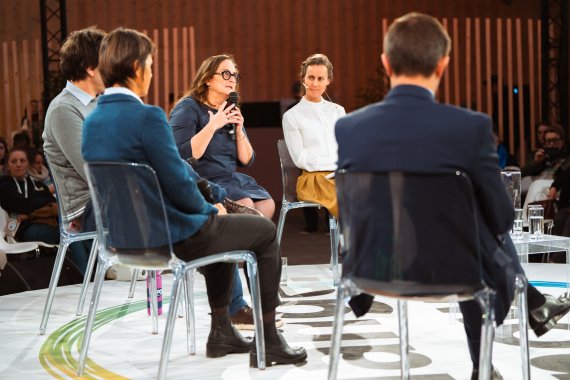
The start-up pitches were definitely a highlight at Sport for Change. A jury consisting of Tobias Gröber, Head of ISPO Group, Michael Ferrisi, founder of the media company Ecolosport, Marie-Laure Piednoir, Director of Corporate Sustainability at Salomon, Fabien Paget, CEO of 17 Sport, Cédric GIRARD, CEO of DJIBE, and myself, evaluated eight projects with an ecological and social impact. The La Virgule and Notpla brands attracted the most attention for their innovation and maturity. But the other candidates were all strong too: We Are Etendart, Institut du Sport Durable, No Water No Us, Réseau Entourage, Game Earth Fund, Urban Youth Games or Swim For Change by eco-adventurer Matthieu Witvoet - all represented inclusive, environmentally conscious and socially critical viewpoints on sport.
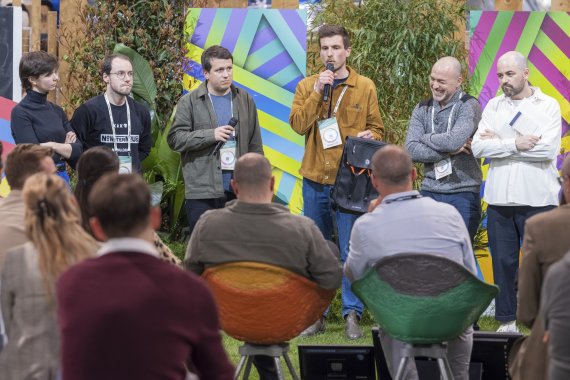
Among the non-sports exhibitors, biotechnology stood out in particular with innovations that protect the oceans or use bioresources that are often processed without the addition of synthetic sources. The American start-up Ravel, for example, presented a solution for "cleaning recycling" that converts dirty, mixed textile waste into drop-in materials that can be used to make new clothing. This creates a fiber-to-fiber circular product. The Chinese company Melephant, supported by the Kering Group, had developed bio-based dyes whose production causes no CO2 emissions. The dyes, which are ZDHC Level 1 and Oeko-Tex Eco Passport certified, are intended for cashmere, cotton, silk and leather fibers.
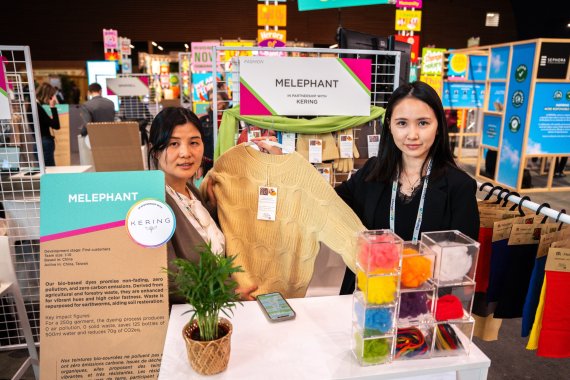
Did you know? More than half of modern society's influencers are athletes! Convinced that ecological transition and sport go hand in hand, changeNOW invited several influential athletes to share their experiences. Among them were true icons of the contemporary sports scene such as Boris Ghirardi from Team Salomon and trail runner Kilian Jornet. The "Athletes for Change" session was organized in collaboration with Matthieu Witvoet and Chloé Léger from Climate Workout. Matthieu is an eco-adventurer in the service of the circular economy and sport. Chloé is a project management and human resources specialist. Their aim was to raise awareness and inspire around forty athletes about the sustainable transition. There were many participants from different disciplines: the sailors Stan Thuret and Arthur Vaillant or the members of climato sportifs Amélie Clerc (fencer), Mathéo Gabon (sprinter) and Younès Nezar (judoka). The workshop was sporty, educational and unifying. It was developed in collaboration with Olympians, coaches, neuroscientists and environmental experts. Participants were asked to explore scenarios around the 2048 Olympic Games and develop solutions. The workshop aimed to promote ecological change with the help of sport.
The trade show was artistically accompanied by curator Ronan De La Croix. Under the motto "Which ship would you choose for a better world?", he created an extraordinary space that invited visitors to dream of change. Thanks to the artists Myriam Le Pihive and Alice Bleton, the exhibition audience was welcomed by a benevolent, creative atmosphere. Romain Pilliard provided the sails of his "Route du Rhum" boat and Uptrade contributed beautiful fabrics.
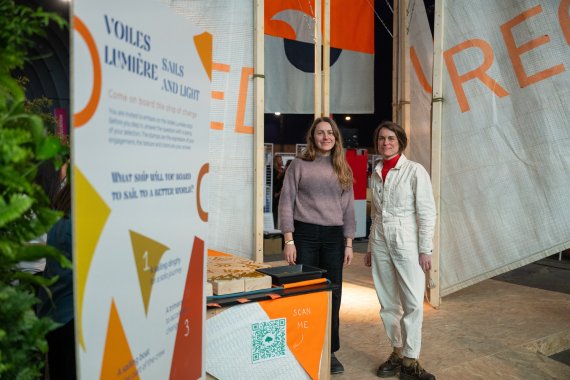
Today, sports sponsorship has a global volume of 73.8 billion US dollars. This support not only plays an essential role in financing events, but also has a cultural and social impact. Partnerships are powerful tools to drive change and promote sustainability. Innovative and more sustainable sponsorships offer the opportunity to drive significant change worldwide. The Sport Sponsors Climate Pledge initiative highlighted new features as well as new supporters and gave an insight into the future of sport partnerships. Julien Pierre from fair play for the planet reported that they are working on a certification of sports facilities. Other great marketing and communication tools were shown by Notpla with their 100% plastic-free packaging and Flycup with their recycled, recyclable and customizable food containers. Rebond, on the other hand, produces footballs and rugby balls in France from an innovative, recyclable mono-material that can be customized with contemporary colors and brand logos.
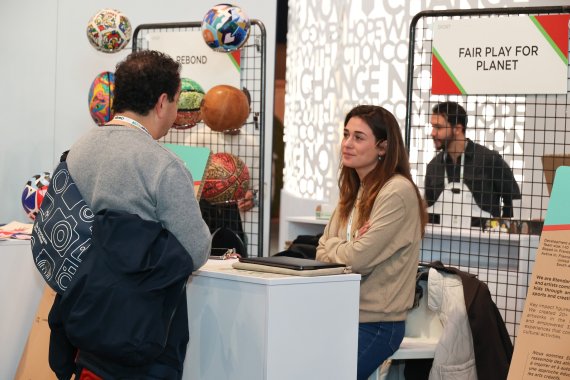
The ISPO Group, represented in Paris by Tobias Gröber, is also joining forces for ecological change in the sports industry. "The partnership with the changeNOW Summit is part of ISPO's transformation. We are expanding our target group from the sporting goods industry to the entire sports and health market and supporting our customers along the change levers of tech, diversity/inclusion, sustainability and design to transform their own business models for future regenerative growth," said the Head of ISPO Group. During the conference, ISPO networked solution providers, opinion leaders, athletes, innovators and decision-makers through formats based on the basic principle of "curated chance", including an innovation dinner.
"We actively bring people together in a small, curated setting who would otherwise not have met, but who we know through our market expertise and that of our network partner NOW Partners that getting to know each other generates added value for both sides," says Tobi Gröber. Such innovation dinners take place throughout the year at events such as UN Climate Week, the Olympic Games in Paris, the COP climate summit and as part of OutDoor by ISPO and ISPO Munich. "Together with NOW Partners, we also offer transformation workshops, scenario planning and year-round InnovationIabs to work collaboratively and cooperatively on solutions in an ever faster changing world and to network across company boundaries."
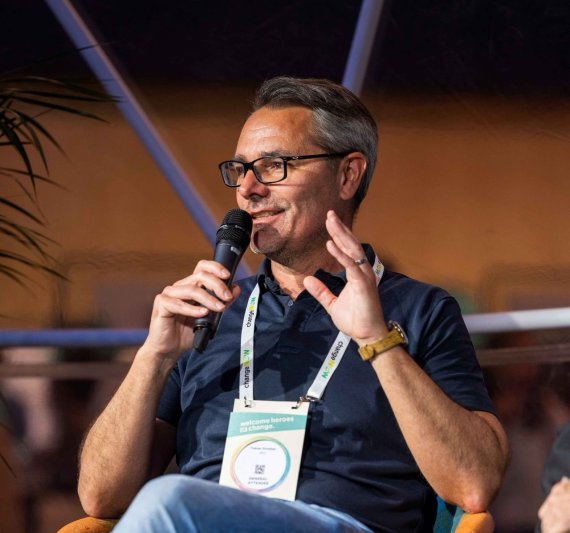
Merijn Dols, Managing Director of NOW Partners, added: "In today's time of change and uncertainty, businesses are facing unprecedented opportunities. It is crucial that industry leaders come together, tackle common challenges and develop ideas. This is what we encourage in our Inno Labs. This is how we accelerate the systemic transition to business models that combine success with a positive impact on people and planet." The impressions of Daniel Truran, CEO of Ebbf and Bcorp™ ambassador, were also positive: "We appreciate the dialog between leaders in one of the most traditional institutions in France. There was a time when careers were to some extent shaped by the school you went to. Today, however, hardly anything is certain and never before has so much innovation been possible. When we come together to envision the future, as we did over dinner, we have seen what happens: the magic of cross-pollinating ideas and the power of networks to make the impossible possible."
The Sustainable Mountain Alliance (SMA) had launched a call for expertise and leadership to find inspiring solutions based on a regenerative economy. The SMA consists of dedicated specialists and scientists such as glaciologist Dr. Heidi Sevestre, Anne Cécile Turner, specialist in systemic governance approaches, Sarah Lewis Obe Oly, mountain sports expert and Olympic champion in alpine skiing, and digital expert Pierre Germeau. Ingrid Beutler, lawyer and co-founder of the movement, was also present in Paris. They made it clear that events such as the Olympic Games are a significant source of CO2 emissions. In addition, global warming can affect mountain areas faster than the rest of the planet - with irreversible local consequences. So is it still possible to organize major sporting events in the mountains in a sustainable way?
In the run-up to the potential hosting of the 2030 Olympic and Paralympic Winter Games in France, it is crucial to consult various stakeholders, encourage them to participate and work together on solutions. This is the only way to ensure a reduced environmental impact and lasting commitments between the region, the brands, the Olympic Committee and the NGOs. This is the aim of the global regenerative think tank, which is jointly run by stakeholders such as Outdoor Sport Valley, Protect Our Winters, the French National Olympic and Sports Committee and the Organizing Committee for the 2023 Alpine World Championships in Courchevel/Méribel and others. For them sustainability is already at the heart of their choice of sponsor. David L'Appartient, President of the CNOSF, said: "This is part of the challenges that will be discussed on the basis of various criteria." In addition, the opinions of the experts and committees should not be alibis, because the aim is to organize games that take the challenges seriously.
With a collaborative and visionary approach, Sport for Change 2024 represented an important step towards a future in which sport a driving force for positive change in society and the environment. can become. The dynamic and impactful initiative brought together inspiring solutions at the intersection of sport, innovation and social change. The programme aimed to mobilize stakeholders in the sports industry to create sustainable and inclusive practices. In addition, the programme highlighted inspiring projects that contribute to the decarbonization of sporting events and social inclusion in sport. Strengthened by the partnership of ISPO and NOW Partners, Sport for Change 2024 was a breath of fresh air that gave hope and strength. Or as trail running champion Kilian Jornet, who joined via video because he wanted to avoid emissions, said: "The sports industry is part of the problem, but also part of the solution."
- ISPO awards
- Mountain sports
- Bike
- Design
- Retail
- Fitness
- Health
- ISPO Job Market
- ISPO Munich
- ISPO Shanghai
- Running
- Brands
- Sustainability
- Olympia
- OutDoor
- Promotion
- Sports Business
- ISPO Textrends
- Triathlon
- Water sports
- Winter sports
- eSports
- SportsTech
- OutDoor by ISPO
- Heroes
- Transformation
- Sport Fashion
- Urban Culture
- Challenges of a CEO
- Trade fairs
- Sports
- Find the Balance
- Product reviews
- Newsletter Exclusive Area
- Magazine
